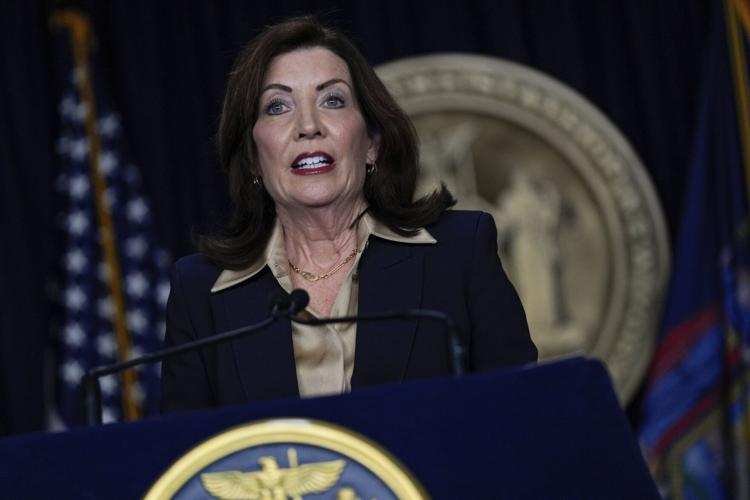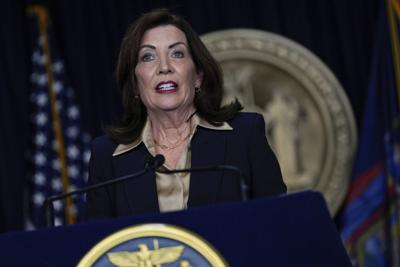It’s not only Canada that is rattled by the launch of a tariff-and-trade war with the United States.
American political and business leaders are also bracing for colder and harder times ahead as they contemplate the impact of higher prices on Canadian goods and a likely drop in exports to their largest trading partner.
Brewers, farmers, retailers, homebuilders, automakers and the commercial fishing industry could all be affected by higher prices on metals, fertilizers, wood products, gas, electricity and .
With U.S. President Donald Trump‚Äôs announcement that Washington would proceed with threatened 25 per cent tariffs on goods from Canada and Mexico, prominent organizations and individuals from across America emerged with last-ditch warnings about the ‚Äúcataclysmic‚ÄĚ repercussions of a Canada-U.S. trade war.

U.S. President Donald Trump speaks in the Roosevelt Room of the White House in Washington on Monday. 
AP‚ÄúIt‚Äôll be devastating,‚ÄĚ said New York Gov. Kathy Hochul, specifically referencing the ‚Äúsynergy‚ÄĚ that exists between Western New York and Ontario.
‚ÄúIt‚Äôs not another country,‚ÄĚ she told CNN Monday. ‚ÄúIt‚Äôs just our neighbours across the bridge.‚ÄĚ
Hochul, a Democrat, took issue with Trump’s logic that the tariffs are intended as punishment for lax Canadian border enforcement that allows fentanyl and migrants to enter the U.S.
Canada says that less than 1 per cent of the fentanyl and migrants entering the U.S. come from Canada.
‚ÄúWe don‚Äôt want a single drug to come across the border, but it does not justify the cataclysmic impact the tariffs will have on the State of New York,‚ÄĚ Hochul said.
Some of the knock-on effects of tariffs are difficult to predict.
The fast-food restaurant chain Chipotle plans to absorb any additional costs rather than pass them on to consumers, . But Massachusetts Gov. Maura Healey has warned that increased costs on oil and natural gas imports from Canada could result in drivers paying more than an additional 20 cents-per-gallon at the pumps.
And three lawmakers from Maine ‚ÄĒ a Republican, a Democrat and an Independent ‚ÄĒ warned¬† that there will be both individual and institutional challenges by complicating trade ties with Canada.
‚ÄúCanada has supplied the oil that Maine people rely on to heat their homes on cold winter nights and the jet fuel and diesel that supports the Air National Guard Base in Bangor,‚ÄĚ they wrote in the letter.
More than 80 per cent of the state’s heating fuel and gasoline is imported from Canada.
‚ÄúSmall businesses and families in Maine and across the country will be caught in the middle during a time when so many are struggling to put food on the table and keep the lights on.‚ÄĚ
Small business owners on either side of the Detroit River arrived at their stores to a new reality: They're in the middle of a trade war (AP video: Mike Householder / March 4, 2025)
The impacts for farmers ‚ÄĒ and the passed-down costs to consumers ‚ÄĒ could be quickly felt as the tariffs come into effect just before the spring planting season, according to The Fertilizer Institute, an industry lobby group.
A month ago, when Trump first threatened tariffs on Canada before granting a one-month reprieve, an exemption for Canadian potash and other fertilizers ‚Äúespecially as we approach the critical time of spring planting where nutrient deliver and application are essential for the harvests that fill America‚Äôs dinner tables with abundant and affordable food.‚ÄĚ
About 90 per cent of America‚Äôs potash fertilizer supply comes from Canada ‚ÄĒ one of just a few source countries.
The Fertilizer Institute said that 2023 saw the use of 5.3 million metric tons of potash on American farms, a meagre 400,000 of which was produced in the U.S.
‚ÄúAny disruption to the intertwined and mutually beneficial cross-border fertilizer trade between the U.S. and Canada will have significant ripple effects, not just for farmers but for the broader food supply chain and ultimately the prices consumers pay at the grocery store,‚ÄĚ the group said.
Minnesota Gov. Tim Walz, a Democrat who ran against Trump as Kamala Harris’s vice-presidential pick, is expected on Tuesday to highlight the impact of tariffs in his state with a visit to a Minnesota farm, underlining the potential hit to exports of soybeans, corn, feed and pork, which bring in more than $9 billion (U.S.) annually.
On the flip side, General Mills, the cereal giant that is headquartered in Minneapolis, .
American tariffs on those imports could raise grocery store prices at a time when companies and consumers are already struggling with inflation.
This has left American businesses walking a fine political line in calling for a mercurial Trump to reverse course while trying not to stand out in opposition to his chaotic and divisive agenda.
U.S. President Donald Trump jolted stock markets Monday by saying he’ll impose 25 per cent
The U.S. Chamber of Commerce noted Monday that inflation is a top policy issue for American families and businesses. Indeed, it is one that Trump himself championed in his campaign to win the White House.
‚ÄúThe Chamber supports the administration‚Äôs efforts to advance pro-growth policies like fewer regulations and less taxation that will grow our economy and expand opportunity, and to fix serious problems like our broken border and stopping the flow of fentanyl in this country,‚ÄĚ .
‚ÄúBut tariffs will only raise prices and increase the economic pain being felt by everyday American across the country. We urge reconsideration of this policy and a swift end to these tariffs.‚ÄĚ
Despite the divisions between Canada and the U.S., it appears that politicians, businesses and families on both sides of the border share one thing: heightened anxiety.
But there is no consolation ‚ÄĒ not even to drown one‚Äôs sorrows in drink.
The Brewers Association, which represents America’s craft brewing industry, has that the American tariffs could increase the costs of key ingredients, including barley and aluminum used to make cans.
































